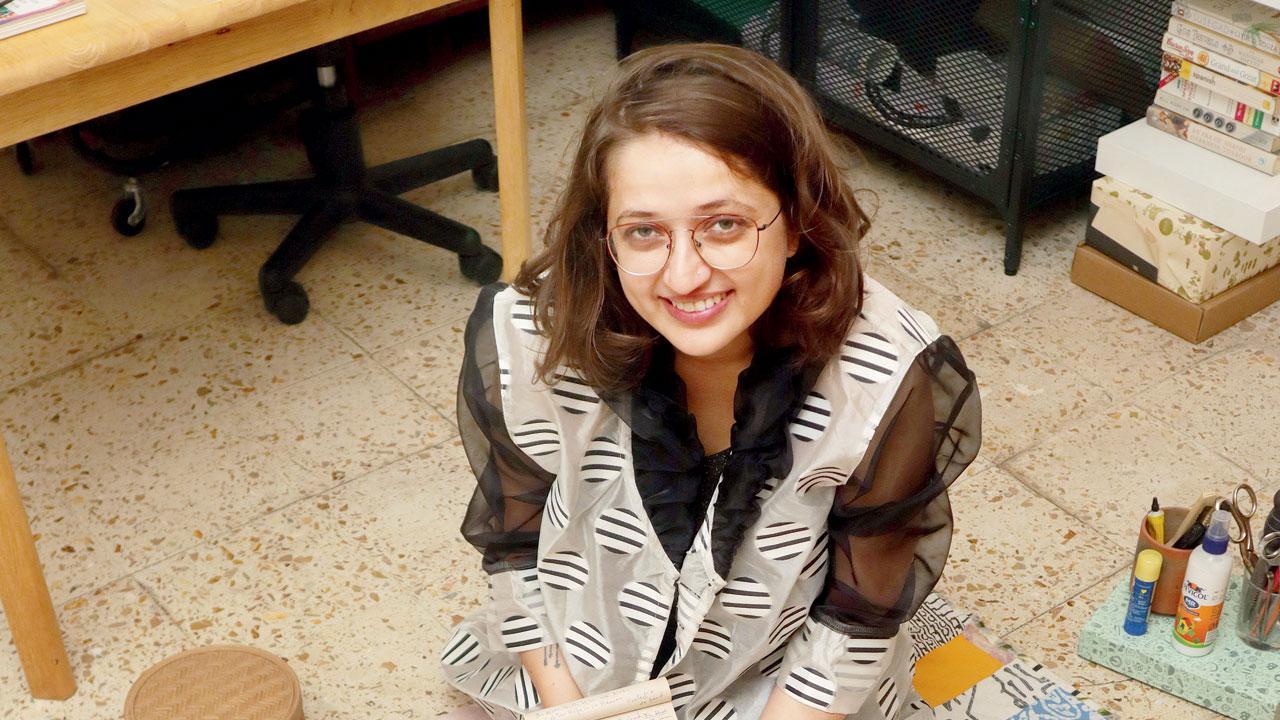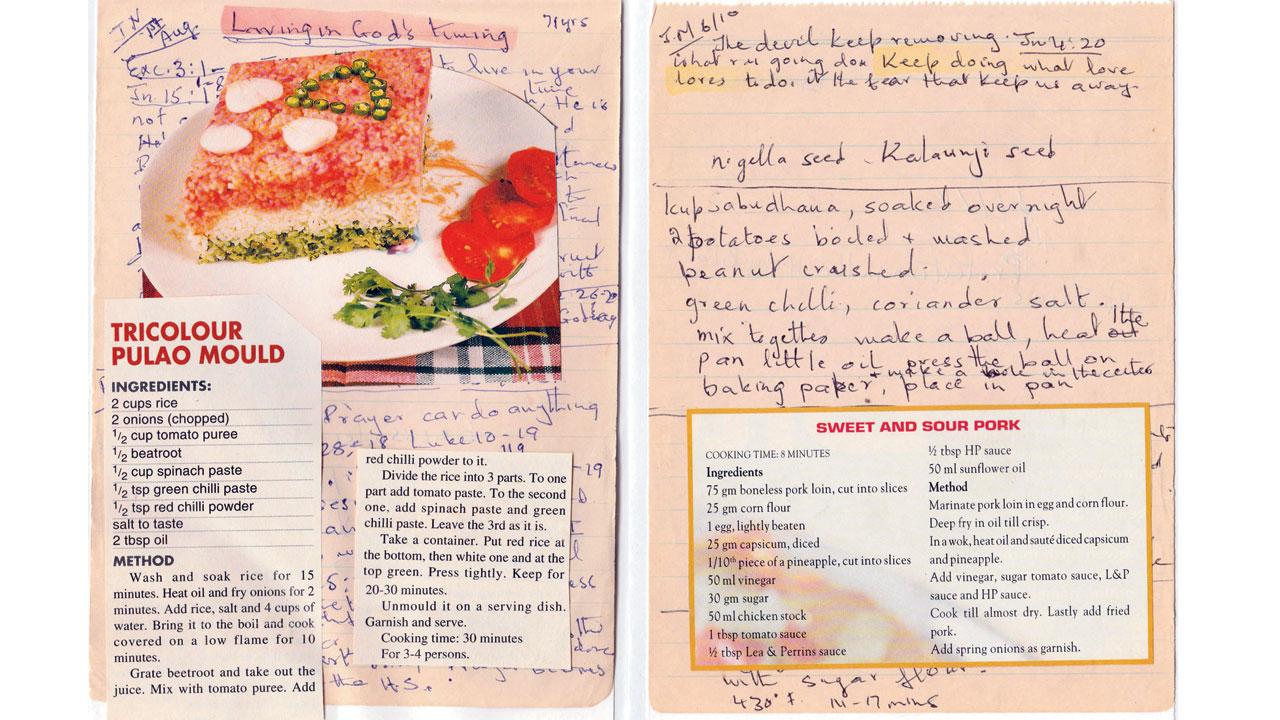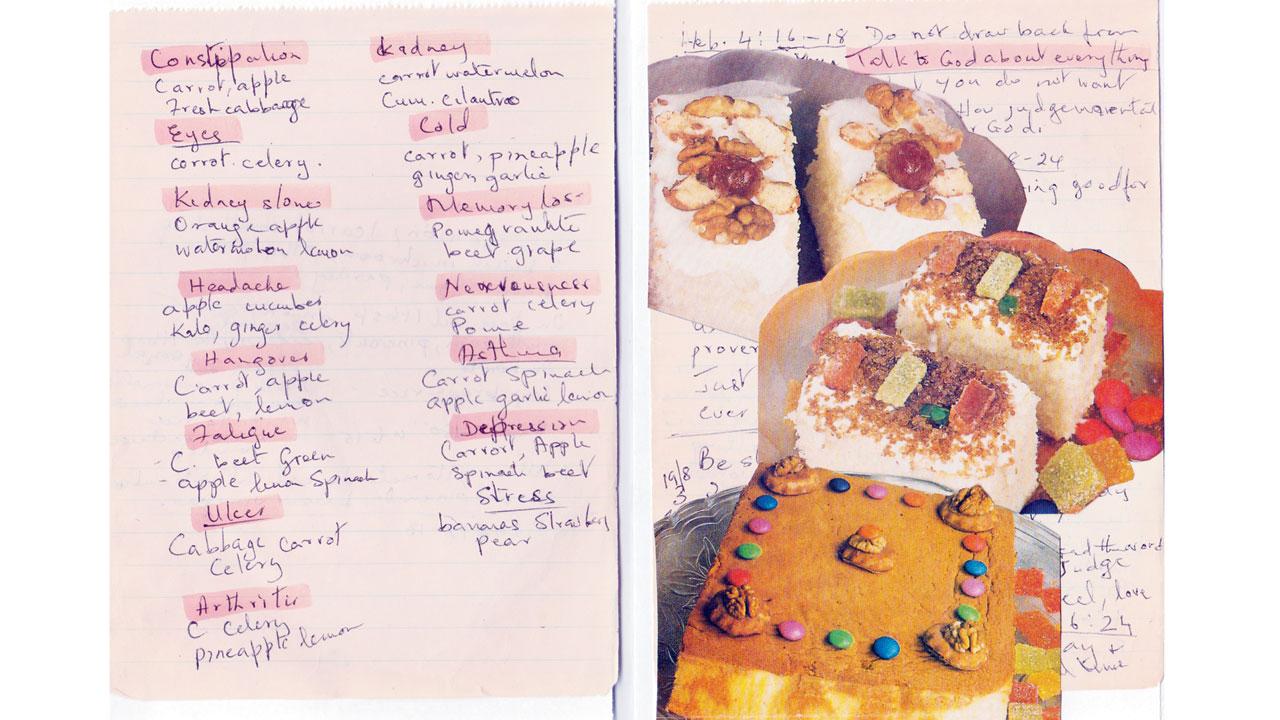A Pune-based artist’s cookbook zine is re-imagined from her grandmother’s prayer book where she made Biblical notes and copied recipes from cookery shows

Pune-based artist, writer and facilitator Sheena Maria Piedade created the zine on the floor of her living room by remixing her grandmother’s prayer book’s content. PIC/M FAHIM
Our grandmothers’ handwritten cookbooks told innumerable stories—their meticulous notes reflected an earnestness to learn, and the bunch of magazine clippings of unfamiliar recipes shined light on their dedication to absorb every piece of information that came their way. How much of this rigour translated in the food that was prepared in the kitchen, one cannot be sure. But, this self-curated collection of how-to-make cutlets, cakes, chole, and chaat offered a rare window into their lives and how food dominated it.
ADVERTISEMENT
Pune-based artist, writer, and facilitator Sheena Maria Piedade found one such gem, when she was given the “unenviable job” of going through her grandmother Bertha Sequeira’s possessions after she passed away in 2018.
While sorting through a pile of old books and newspapers, she found her prayer book—a notebook that Sequeira used to copy verses from the Bible into, during her daily readings. Or that’s what Sheena thought. “Scribbled next to the prayers were recipes noted down from cooking shows and copied out from books. Most were untitled or incomplete. The back of the prayer book was stuffed with clippings of recipes cut out from newspapers and magazines,” remembers Sheena.

Spirit + Spice is a cookbook zine handmade with materials found from Bertha Sequeira’s prayer book, which contains over 15 recipes that Bertha had sourced from magazines, newspapers and calendars
The chance discovery came as a surprise. “I had not really looked through my grandmother’s prayer books, despite living with her for most of my life. This was not just a devout Catholic grandmother, but a person with her own identity and very real interests, tastes, and desires. She was pious, but this double use for the book seemed normal to her. I found that humorous,” she says in an email interview, adding, that it made “perfect sense for her to use the book that was always accessible to hurriedly note down recipes from cooking shows, or from friends on the phone. Many of the recipes are actually just ingredient lists or instructions with no title. She read the paper every morning and loved to collect things, so her notebooks became a kind of repository for what she found compelling.”
Sheena’s grandmother grew up in Margao, Goa, moving to Bombay in the early 1940s with her family as a teenager so that she and her siblings could further their education. “She lived in a chawl in Dabul [Chira Bazaar], then in Doha, Qatar, for nearly two decades, before moving to Pune when my grandfather retired. She was a schoolteacher for most of her life, and very involved in the church as well as community and charity work,” she recalls. Sequeira also loved to cook and feed people, and create handmade things. “These are definitely qualities I have inherited from her,” confesses Sheena, who is the editor of LOVER, an online arts and lifestyle magazine she founded in 2016.
Sheena shares how her grandmother learned to send emails more than two decades ago, because her children moved abroad. “Being separated from her when I was a teen [Sheena briefly lived with her mother], she often sent me her recipes by email. I was fascinated that my family cookbook was not in fact a book, but email inboxes, which is a big departure from what people like to believe about Indian grandmothers and the legacies they leave behind,” she says, adding, “My projects respond to the fantastical stereotypes in Indian food writing about watching our grandmothers cook with love. Sure, that’s true for some, but many of us have learned to cook in other ways—guess what, so did our grandmothers.”

Sheena’s latest work, Spirit + Spice, is a cookbook zine handmade with materials found from her grandmother’s prayer book, and contains over 15 recipes that Sequeira had sourced from magazines, calendars and newspapers. Magazine clippings are juxtaposed with handwritten prayers and Biblical teachings—easy chocolate fudge resting below a verse on “Christ is the anointing one” and a mango souffle dish sharing room with a Gospel of Matthew.
Sheena was working on another cookbook project when the idea for creating this zine came to her. The catalyst, she says, was being accepted into a FICA (Foundation for Indian Contemporary Art) workshop on zine-making that explored the intersections between acts of reading and concepts of care. “Renuka Rajiv, the artist who was leading the workshop, taught us how to lay out, number, and piece together pages of a zine without digital intervention. It was in this brief that I suddenly remembered the prayer book and returned to it, at first because I wanted to use material that did not need any technology. At that point, I hadn’t yet delved deeply into the contents, so the zine took form organically and iteratively. I created the zine over 24 hours on the floor of my living room, simply by remixing the prayer book’s content. I loved both—the restriction of time and the limitation of materials—although the latter was a choice I made myself.”
The zine was exhibited at the FICA booth at India Art Fair earlier this year. Among the more fascinating pages in the zine, and which Sheena has replicated as is from the original prayer book, is a page dedicated to natural home remedies. There’s carrot and apple for constipation, ginger-garlic for cold, pineapple for arthritis, and bananas for stress. “I love the contrast of these natural remedies against the recipes for cakes and desserts in the zine. I am certain that many articles were kept as gestures of care. My grandmother did not drink cocktails but may have cut them out for me [the word ‘Spirit’ comes from the title of that article, but indicates Sequeira’s spiritual beliefs]. The benefits of manuka honey were cut out because most of her children have immigrated to New Zealand, where this is found. She kept a recipe for tricolor pulao and we don’t generally associate patriotism with the average Goan aunty. I enjoyed these discoveries, and noticing assertions of her identity and investments in relationships,” she says.
As an artist and photographer, who works very closely with material memory, Sheena feels there’s so much potential in these cookbooks not just culturally, to preserve the recipes themselves, but to become curious about where we come from, by reading between the lines. “Zines, archives, websites, books, pop-ups, restaurants—there are endless possibilities to treasure and continue to pass on these legacies, especially when they indicate the full personhood of the people who created them.”
To download the zine thisislover.com/found/spirit-spice-digital
 Subscribe today by clicking the link and stay updated with the latest news!" Click here!
Subscribe today by clicking the link and stay updated with the latest news!" Click here!







